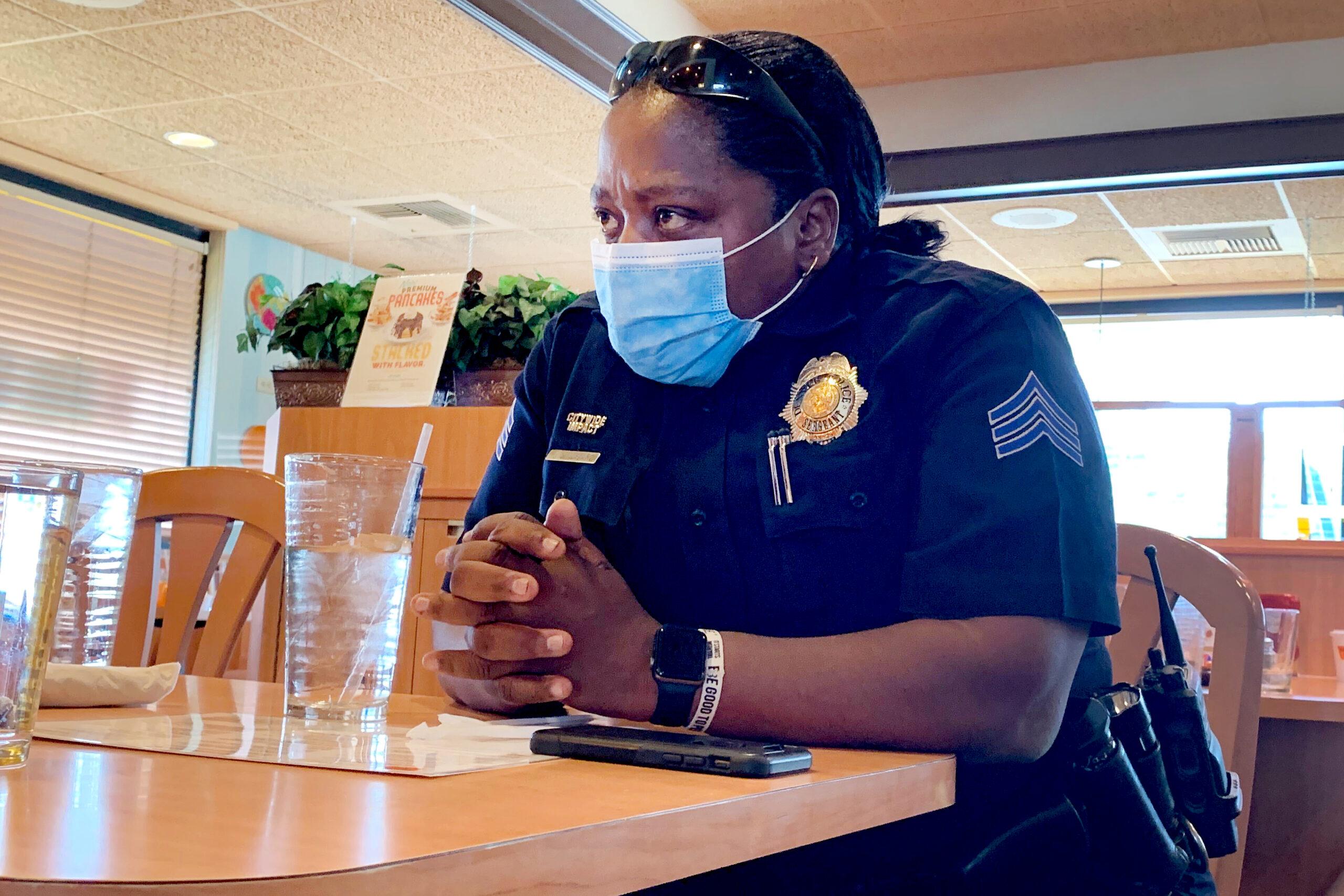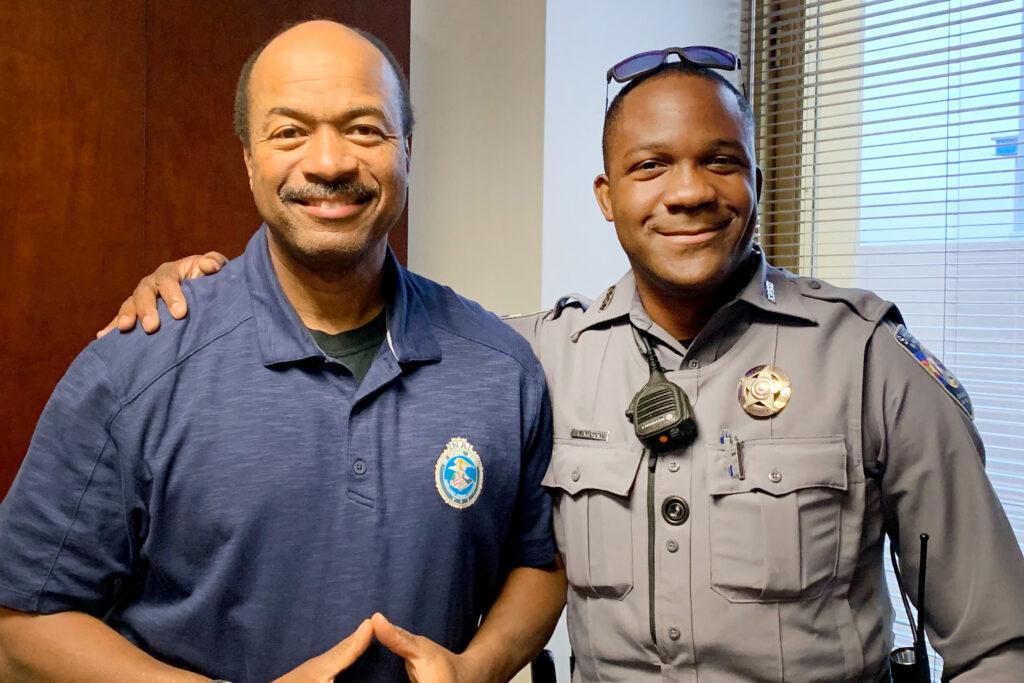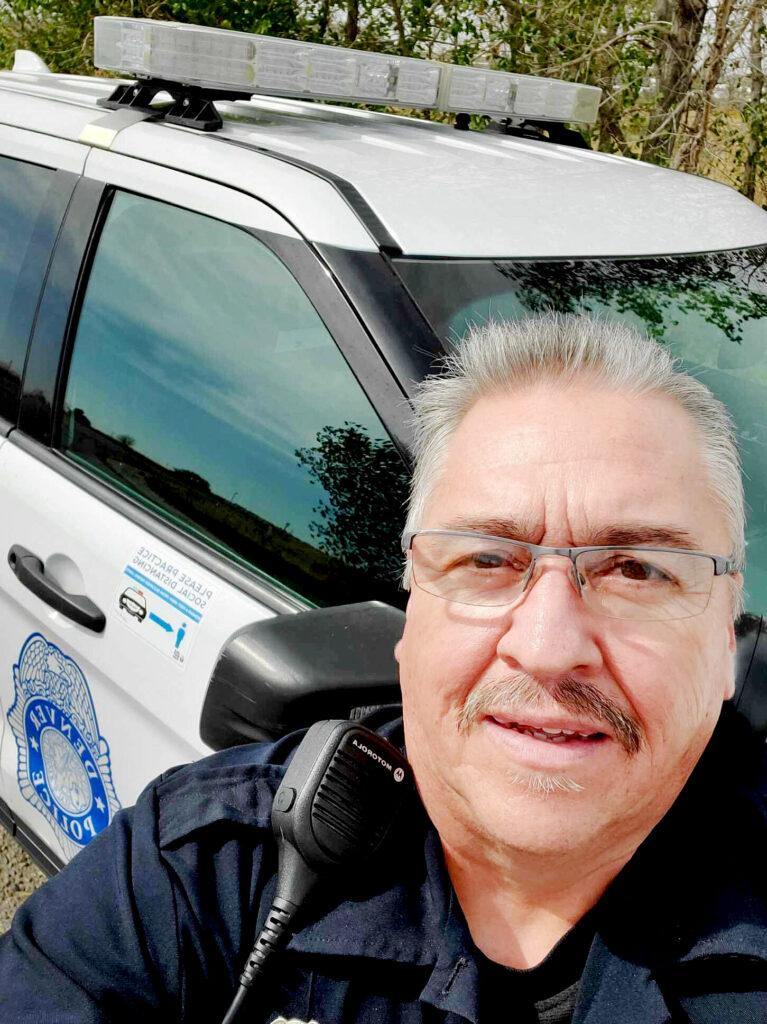
Clif Northam has been stopped by police countless times.
He’s been tailed for miles in his car. Asked for his ID. Stopped for no reason at all. In the most unnerving of incidents, he was asked to get on his knees at gunpoint and put his hands on his head by officers looking for two felony suspects in the area where Northam was driving with his son.
Northam is Black, and a bureau chief in the El Paso County Sheriff’s Office.
“I’ve been a cop for 38 years now and it still bothers me. The hair on the back of my neck stands up when I see a police car behind me, especially if it follows me,” Northam said. “Even though I’m a chief, it still is a scary thing.”

Black and Latino law enforcement officers have been feeling the anger from protesters on the streets in the months since the summer death of George Floyd in MInnesota. They have a foot in both camps — sharing the life experiences that fuel the protests while seeking to change their profession from within.
Over the last month, CPR News talked to six Black and Latino officers in Denver, El Paso County and Lakewood about what it’s like to do their jobs at this moment of time, how some of the deaths of citizens at the hand of police have affected them and whether they think police reform needs to happen.
Tough conversations on the force
Sgt. Carla Havard was among the few Black women at the Denver Police Department when she started on patrol in Park Hill in the late 1990s.
She worked the beat in the neighborhood well, getting to know residents, befriending business owners. She got promoted and worked her sources in the neighborhoods to try to crack down on crime as an investigator. Gangs were a problem at the time and so when she showed up somewhere, people were usually happy to see her.
“You can drive up and down, you know their family, you know their children. Policing is not just about consequence and accountability,” she said. “It’s about a journey.”
Sgt. Havard is now senior enough for a downtown job and a daytime shift. She follows every detail of every high profile officer-involved death in the country. She watched the entire George Floyd tape because she felt like she had to.
“I was offended by the callousness of the officers and the disregard of our core responsibility wearing this uniform and that is the preservation of life,” she said. “They completely disregarded that. I wish one of them would have had the courage to stop the other.”
Havard said she’s had tough conversations with fellow officers at DPD since Floyd’s death.
Some officers don’t understand why people are marching at all — particularly when the officers involved were swiftly arrested.
Others, she said, are taking it personally, and have reacted more defensively.
“We need to make sure our officers don’t personalize this to the point that they may have some outside independent action. We have to make sure their mind is in the right place,” she said, referring to how her fellow officers view protesters. “It’s not us-against-them.”
Havard said she understands racism. She has been trailed around in stores by security guards, and bypassed at the meat counter in favor of white customers who approached after her. Earlier this summer, she worked on the lines of a police brutality protest. People threw things at her and yelled insults that she won’t repeat.
“It’s tough out there, getting called all kinds of names,” Havard said. “I get it, they’re frustrated, but it’s hard to hear, all the offensive language, the derogatory names and everything. I know it’s coming from a place of pain.”
The Peace Officers Standards and Training Board, which manages Colorado law enforcement officers’ certification and training, does not track the racial makeup of the state’s law enforcement workforce. In Denver, of more than 1,500 officers, 22 percent are Latino and 9 percent are Black. Nationally, about 1 in 4 officers are Black or Latino, according to a Department of Justice report from 2016.
Officers shaped by experiences from both sides of the badge
Lakewood Police Officer Paul Osckel said the protests and the heightened scrutiny on how he does his job has made him think about how he responds to calls, especially when the caller’s reasoning for asking for police help is vague.
“We are taking a deeper interest in ‘suspicious people.’ Why are they ‘suspicious’? It’s opened our eyes to some of the calls we’re getting from residents,” Osckel said. “Our main function is to enforce the law and to protect our community ... but sometimes we need to protect the person who is getting called in on. Are they doing anything wrong? Does it warrant a police contact? It’s at the forefront of my mind.”
Last year, it was a “suspicious” person call that led Aurora police to Elijah McClain, a Black 23- year-old who was walking down the street waving his hands in the air, listening to headphones and wearing a ski mask. McClain was not suspected of committing any crime when police attempted to detain him -- he eventually died after officers put him in two carotid holds and paramedics injected him with ketamine.
Osckel said he understands racism, because “I’ve been a Hispanic male growing up in the Littleton suburbs all my life … I’ve experienced things.”.
El Paso County Sheriff’s Det. Trey White tries to call officers on profiling when he sees it — or when he experiences it himself as a Black man.
“There are times I’ve been contacted and I’m like, ‘you profiled me, man’” White said. “Because … if it was a legitimate stop, I would have gotten a ticket. I’ve never been cut so many breaks in my life. So, it exists. And fortunately for me, I can stop that situation when it goes south, because I have knowledge of it … There are people who do not have the same voice I have. To them, it’s probably suffocating. They know they’ve been treated wrong, but they don’t know how to articulate it. We have a responsibility to make that better.”
A 2019 Pew Research Center study found that 84 percent of Black adults said that, in dealing with police, Black people are generally treated less fairly than whites and 63 percent of whites agreed. The same study found Black adults are five times as likely to say they have been unfairly stopped by police and two-thirds of Black adults say they have been treated more suspiciously because of their race.
‘They’ll tell us we’re killers’
Denver Police Officer Reyes Trujillo has worked patrol since the 1990s, primarily in Globeville, Swansea and Park Hill. He has felt the peaks and valleys of police popularity throughout his long career. After 9/11, restaurants covered his meals and total strangers would bring Starbucks to his vehicle, thanking him for his work.
“Now, people feel more emboldened to flip us off or challenge us publicly,” Trujillo said. “They’ll tell us that we’re killers, they’ll ask if we’ve killed any Black people recently … For me, I’ve tried to do the right thing on a daily basis. It’s challenging.”

An officer friend of Trujillo’s suffered a concussion after he had a firework thrown at him while he patrolled a protest downtown.
“To see your friends, people you care about get injured like that, he didn’t do anything wrong. He wasn’t in Minneapolis,” Trujillo said. “I appreciate the protest. I abhor the violence.”
That late August protest led to 13 arrests. The majority of demonstrations in Denver over the course of the summer have been peaceful.
Working on the reform from inside the ranks
All of the officers interviewed by CPR News said they stay in the profession to try and change it from the inside.
El Paso County Deputy Edwin Wilson said during a recent traffic stop, the African-American driver questioned whether he'd been pulled over for his race, and told Wilson he felt unsafe being stopped by a cop in America. The deputy listened to him and heard his story about how an officer had killed his cousin. Wilson said he apologized.
“I told him, ‘hey I can’t fix this, I can’t bring your cousin back,’” he said. “I don’t know that situation, I don’t know the story. Regardless, somebody dying — it’s not a good thing. That’s not my goal, that’s not anyone in this career field that I know, that’s not their goal.”
Wilson said he was surprised, and a bit hurt, by man's reaction to being stopped. He's not ignorant of national incidents of police violence against people of color, and said the focus should be on how departments -- and communities -- can improve for the future.
“I told him, hey I can’t fix this, I can’t bring your cousin back,” he said.
Sgt. Havard works to recruit both more women and more officers of color at DPD.
“Historically, why would you want to be part of an organization or a profession that hadn’t treated your community properly? You can fix something from the outside or the inside; I’m choosing to fix it from the inside,” she said. “We have to be courageous to be part of the conversation, to look at our agencies to make sure we’re doing things the right way. You want to fix it? Come help me fix it from within.”








